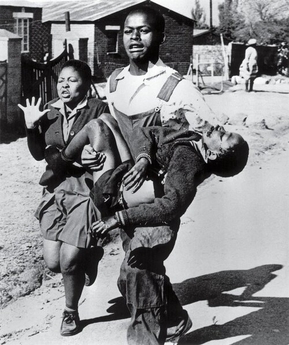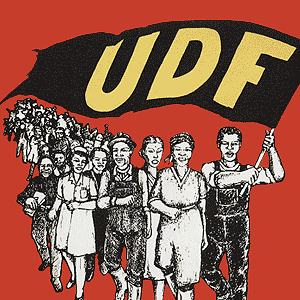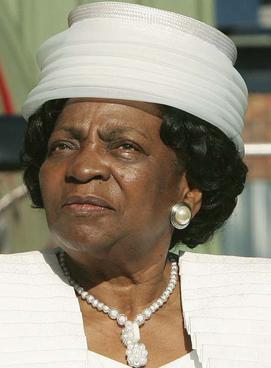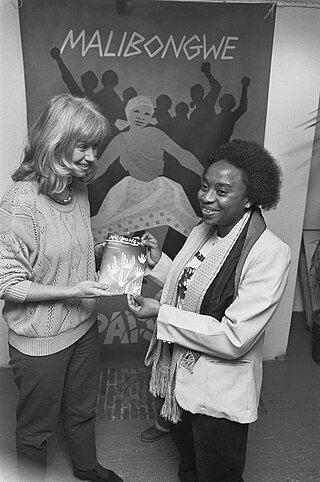Related Research Articles

Soweto is a township of the City of Johannesburg Metropolitan Municipality in Gauteng, South Africa, bordering the city's mining belt in the south. Its name is an English syllabic abbreviation for South Western Townships. Formerly a separate municipality, it is now incorporated in the City of Johannesburg Metropolitan Municipality and is one of the suburbs of Johannesburg.

Winnie Madikizela-Mandela, also known as Winnie Mandela, was a South African anti-apartheid activist and the second wife of Nelson Mandela. She served as a Member of Parliament from 1994 to 2003, and from 2009 until her death, and was a deputy minister of arts and culture from 1994 to 1996. A member of the African National Congress (ANC) political party, she served on the ANC's National Executive Committee and headed its Women's League. Madikizela-Mandela was known to her supporters as the "Mother of the Nation".

Albertina SisuluOMSG was a South African anti-apartheid activist. A member of the African National Congress (ANC), she was the founding co-president of the United Democratic Front. In South Africa, where she was affectionately known as Ma Sisulu, she is often called a mother of the nation.

The Constitution Hill precinct is the seat of the Constitutional Court of South Africa. It is located in Braamfontein, Johannesburg near the western end of the suburb of Hillbrow. The complex consists of the Constitutional Court, the Old Fort Prison and museum.

The Soweto uprising, also known as the Soweto riots, was a series of demonstrations and protests led by black school children in South Africa during apartheid that began on the morning of 16 June 1976.

The United Democratic Front (UDF) was a South African popular front that existed from 1983 to 1991. The UDF comprised more than 400 public organizations including trade unions, students' unions, women's and parachurch organizations. The UDF's goal was to establish a "non-racial, united South Africa in which segregation is abolished and in which society is freed from institutional and systematic racism." Its slogan was "UDF Unites, Apartheid Divides." The Front was established in 1983 to oppose the introduction of the Tricameral Parliament by the white-dominated National Party government, and dissolved in 1991 during the early stages of the transition to democracy.

Nnoseng Ellen Kate Kuzwayo was a South African women's rights activist and politician, who was a teacher from 1938 to 1952. She was president of the African National Congress Youth League in the 1960s. In 1994, she was elected to the first post-apartheid South African Parliament. Her autobiography, Call Me Woman (1985), won the CNA Literary Award.

Adelaide Frances Tambo was a South African anti-apartheid activist and former political exile.
Zephania Lekoame Mothopeng was a South African political activist and member of the Pan-Africanist Congress (PAC).
Miriam Tlali was a South African novelist. She was the first black woman in South Africa to publish an English-language novel, Muriel at Metropolitan, in 1975. She was also one of the first to write about Soweto. She also wrote Amandla in 1980 which focuses on the Soweto Uprising in 1976, as well as a collection of short stories called Soweto Stories which was published in 1989. Most of her writing was originally banned by the South African apartheid regime.

Internal resistance to apartheid in South Africa originated from several independent sectors of South African society and took forms ranging from social movements and passive resistance to guerrilla warfare. Mass action against the ruling National Party (NP) government, coupled with South Africa's growing international isolation and economic sanctions, were instrumental in leading to negotiations to end apartheid, which began formally in 1990 and ended with South Africa's first multiracial elections under a universal franchise in 1994.

Sarafina! is a 1992 musical drama film based on Mbongeni Ngema's 1987 musical of the same name. The film was directed by Darrell Roodt and written by Ngema Mbongeni and William Nicholson, and stars Leleti Khumalo, Miriam Makeba, John Kani, Ngema, and Whoopi Goldberg; Khumalo reprises her role from the stage performance.

The South African Youth Revolutionary Council (SAYRCO) was a South African political organisation. SAYRCO profiled itself as a 'third force' in the anti-Apartheid struggle. It was associated with the Black Consciousness Movement.
Joyce Nomafa Sikakane, later Sikakane-Rankin, is a South African journalist and activist. She was detained by the Apartheid South African government for 17 months for her anti-apartheid activism.
Joyce Piliso-Seroke is a South-African educator, activist, feminist and community organizer. A former vice president of the World YWCA, she traveled internationally to speak about the effects of apartheid, overcoming imprisonment and attempted censorship in her pursuit of justice and gender equality. She is a member of South Africa's national Order of the Baobab in Gold, and was appointed the first chair of the South African Commission for Gender Equality.
Abu Baker Asvat, also known as Abu Asvat or Abu nicknamed Hurley was a South African medical doctor who practised in Soweto in the 1970s and 1980s. A founding member of Azapo, Asvat was the head of its health secretariat, and involved in initiatives aimed at improving the health of rural black South Africans during Apartheid.

Robben Island Prison is an inactive prison on Robben Island in Table Bay, 6.9 kilometers (4.3 mi) west of the coast of Bloubergstrand, Cape Town, South Africa. Nobel Laureate and former President of South Africa Nelson Mandela was imprisoned there for 18 of the 27 years he served behind bars before the fall of apartheid. Since then, three former inmates of the prison have gone on to become President of South Africa.
Thandi Ndlovu was a South African medical doctor and businesswoman who was best known as the founder of the Motheo Construction Group.

Mavivi Myakayaka-Manzini, also known as Mavivi Manzini, is a South African politician and diplomat who is currently the South African High Commissioner to Malawi. She was a member of the National Executive Committee of the African National Congress (ANC) between 1994 and 2007 and she was deputy president of the ANC Women's League between 2003 and 2008. During apartheid, she worked in exile in the secretariat of the ANC's women's section; in the 2000s, after one term in the national Parliament (1994–1999), she headed the ANC's international relations desk.
Sediane Danny "Sechaba" Montsitsi was a South African politician and former anti-apartheid activist. One of the leaders of the 1976 Soweto uprising, he later represented the African National Congress in Parliament from 1994 to 2014.
References
- 1 2 sahoboss (2011-02-17). "Connie Mofokeng". South African History Online. Retrieved 2018-08-06.
- ↑ sahoboss (2011-03-21). "A List of women involved in the women's struggle in South Africa, 1900-1994". South African History Online. Retrieved 2018-08-06.
- ↑ Hassim, Shireen (2006-06-26). Women's Organizations and Democracy in South Africa: Contesting Authority. Univ of Wisconsin Press. ISBN 9780299213831.
- 1 2 Russell, Diana E. H. (September 2003). Lives of Courage: Women for a New South Africa. iUniverse. ISBN 9780595291397.
- ↑ "Connie Mofokeng, interview by Diana Russell, South Africa, 1987 | Alexander Street, a ProQuest Company". search.alexanderstreet.com. Retrieved 2018-08-06.